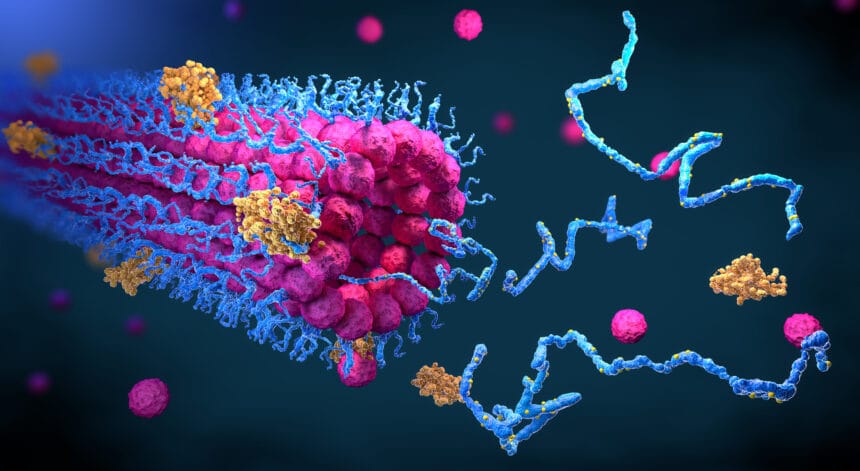In the world of athletic performance, endurance athletes are constantly seeking ways to enhance their strength and stamina. The best peptides for endurance athletes have emerged as a promising avenue to improve athletic performance and push the boundaries of physical capabilities. These small protein fragments have an influence on various physiological processes, offering potential benefits in areas such as muscle growth, recovery, and overall endurance.
As the field of sports nutrition evolves, peptides are causing a revolution in how athletes approach their training and competition. This article delves into the top peptides for enhancing endurance, exploring their mechanisms of action and potential benefits. It also examines peptides that may help with muscle growth and recovery, crucial aspects for endurance athletes. Additionally, the piece addresses safety considerations, proper usage, and legal aspects to provide a comprehensive guide for athletes looking to optimize their performance through peptide supplementation.
Understanding Peptides for Athletic Performance
What are peptides?
Peptides are short chains of amino acids that play a crucial role in various biological processes. These mini-proteins are the building blocks of larger proteins and have unique sequences that determine their specific functions. In the context of athletic performance, peptides have gained attention for their potential to enhance strength, stamina, and recovery.
How do peptides work?
Peptides interact with specific receptors in the body, triggering a cascade of responses that lead to desired outcomes. They can influence muscle growth, tissue repair, and hormonal regulation. For endurance athletes, certain peptides work by increasing the body’s production of ATP (adenosine triphosphate), a compound that provides energy to muscles during exercise. This increase in ATP production may lead to improved endurance and the ability to train harder and for longer periods. Check more with Muscle Growth Peptides.
Benefits for endurance athletes
Endurance athletes, such as long-distance runners, swimmers, and cyclists, may benefit from peptides in several ways. These bioactive compounds can help boost stamina and endurance by improving cardiovascular function and oxygen utilization. Some peptides show promise in increasing endurance levels, allowing athletes to sustain peak performance for extended periods.
Additionally, peptides may aid in injury recovery and reduce recovery times from intense workouts. They can promote healing by increasing blood flow to injured tissues and stimulating the production of new tissue. Peptides may also help reduce inflammation, which is essential in reducing pain and allowing the body to recover faster.
Top Peptides for Enhancing Endurance
IGF-1 LR3, a modified version of insulin-like growth factor-1, has an influence on muscle growth and repair. This peptide has the potential to enhance muscle endurance by promoting protein synthesis and inhibiting protein breakdown. Athletes may experience improved muscle recovery and increased lean muscle mass, which can contribute to better endurance performance. IGF-1 LR3 also has an impact on reducing inflammation, potentially leading to faster recovery times between workouts.
MK-677, also known as Ibutamoren, is a growth hormone secretagogue that stimulates the production of growth hormone and IGF-1. This peptide has shown promise in increasing lean muscle mass and decreasing body fat, which can be beneficial for endurance athletes. MK-677 may also improve sleep quality, allowing for better recovery and overall performance. Some studies suggest that MK-677 can increase growth hormone levels without disrupting other hormones, making it an attractive option for athletes seeking to enhance their endurance capabilities
While not typically associated with endurance performance, PT-141 (Bremelanotide) has shown potential in improving blood flow. Originally developed for sexual dysfunction, this peptide may support better circulation during endurance activities. By enhancing blood flow, PT-141 could potentially improve oxygen delivery to muscles, leading to increased stamina and endurance. However, more research is needed to fully understand its effects on athletic performance.
Peptides for Muscle Growth and Recovery
Sermorelin-Ipamorelin-CJC1295
Endurance athletes seeking to enhance their performance and recovery can benefit from the combination of Sermorelin, Ipamorelin, and CJC-1295. These peptides work synergistically to stimulate the production of growth hormone, which has an influence on muscle growth, recovery, and overall athletic performance. Sermorelin and CJC-1295 are growth hormone-releasing hormone (GHRH) analogs that stimulate the pituitary gland to increase the natural production of human growth hormone (HGH). Ipamorelin, on the other hand, is a growth hormone-releasing peptide that works by mimicking ghrelin, a hormone responsible for appetite regulation and metabolism.
This peptide combination has the potential to enhance muscle mass, improve recovery times, and increase fat loss. By promoting higher levels of HGH, these peptides can help improve recovery times after intense workouts, allowing for more frequent and effective training sessions. Additionally, they may contribute to regulated sleep patterns, which are crucial for muscle repair and growth.
BPC-157
BPC-157, also known as the “body protection compound,” has gained attention in the athletic community for its potential healing and regenerative capabilities. This peptide has shown promise in accelerating the healing of wounds, muscle and tendon injuries, and even gastrointestinal damage. For endurance athletes, BPC-157 may help to speed up recovery from injuries and reduce inflammation, allowing for quicker returns to training and competition.
TB-500
TB-500, or Thymosin Beta-4, is another peptide that has shown potential benefits for muscle growth and recovery. This naturally occurring peptide plays a crucial role in tissue regeneration and wound healing processes. TB-500 has the ability to promote the activation of satellite cells, which are essential for muscle regeneration. By enhancing the migration and differentiation of these cells, TB-500 may help to expedite the repair process, allowing athletes to recover more quickly from intense training sessions.
Safety Considerations and Proper Usage
Consulting healthcare professionals
Athletes considering the use of peptides to enhance their endurance should prioritize consulting with healthcare professionals who specialize in sports medicine and peptide therapy. These experts can provide guidance on selecting the most appropriate peptides for individual needs and goals. They can also help athletes understand the potential risks and benefits associated with peptide use, ensuring a safe and effective approach to performance enhancement.
Dosage guidelines
Proper dosage is crucial when using peptides for athletic performance. The recommended dosage can vary depending on the specific peptide, the athlete’s body composition, and their training regimen. It’s essential to adhere to the guidelines provided by healthcare professionals to achieve optimal results and minimize the risk of side effects. Peptides can be administered through various methods, including injections, sublingual applications, nasal sprays, and topical creams. The most suitable delivery method should be determined in consultation with a medical expert.
Potential side effects
While peptides are generally well-tolerated, athletes should be aware of potential side effects. Common issues may include injection site reactions, temporary water retention, and mild headaches. More serious adverse effects, though rare, can occur if peptides are used inappropriately or in excessive doses. These may include allergic reactions, heart problems, and gastrointestinal issues. Athletes should monitor their bodies closely and report any unusual symptoms to their healthcare provider immediately.
It’s important to note that the long-term effects of peptide use are not fully understood due to limited research. Athletes should approach peptide supplementation with caution and always prioritize their health and safety over performance gains. Additionally, some peptides may be prohibited in competitive sports, so athletes must be aware of the legal considerations and potential consequences of using performance-enhancing substances.
Conclusion
Peptides have emerged as a promising avenue for endurance athletes to enhance their performance and push their physical limits. These small protein fragments have an influence on various aspects of athletic performance, including muscle growth, recovery, and overall endurance. By interacting with specific receptors in the body, peptides like IGF-1 LR3, MK-677, and PT-141 can potentially boost stamina, improve cardiovascular function, and aid in injury recovery, allowing athletes to train harder and longer.
While peptides show great promise, it’s crucial for athletes to approach their use with caution and under professional guidance. Consulting with healthcare professionals, following proper dosage guidelines, and being aware of potential side effects are essential steps to ensure safe and effective use. As research in this field continues, peptides may play an increasingly significant role in helping endurance athletes achieve new levels of strength and stamina, revolutionizing the world of sports nutrition and performance enhancement.










